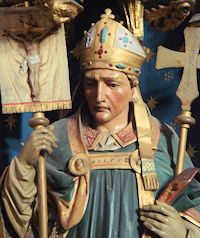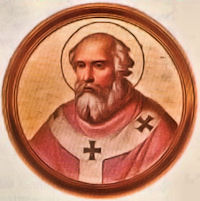Easter: April 19th
Saturday of the Fourth Week of Easter
Other Commemorations: St. Leo IX, Pope (RM); St. Alphege, Archbishop and Martyr (RM)
» Enjoy our Liturgical Seasons series of e-books!
Pope Benedict XVI's Apostolic Jouney to the United States
Welcome Holy Father!
9:15 a.m. Mass for priests, deacons and members of religious orders at St. Patrick’s Cathedral in the heart of New York City.
4:30 p.m. The Holy Father will meet with young Catholics, including 50 youngsters with a range of disabilities, at St. Joseph Seminary in Yonkers. Thousands of young people, including hundreds of seminarians, are expected to participate in a rally/prayer service and to hear the pope speak.
For complete information see: Christ Our Hope
Jesus said to his disciples, "This is my commandment: love one another as I have loved you. There is no greater love than this, to give one's life for one's friends; and you are my friends if you do what I command you. I shall not call you servants any more, because servants do not know what their master is about. Instead I have called you friends, since I have made known to you everything I learned from my Father. You did not choose me; it was I who chose you and sent you to go and bear fruit, fruit that will last. And everything you ask the Father in my name, he will give you. This is my command, that you love one another (Jn 15:12-17)."
"This is my commandment: love one another as I have loved you"
Our Lord exhorts us to fraternal love: "Love one another as I have loved you" (Jn 15:12), that is to say, as you have seen me loving and you will still see me love. Jesus speaks to you as a friend, for He has told you that his Father calls you, that He wants you to become an apostle, and that He expects you to bear fruit, a fruit that is manifested through love. St. John Crysostom affirms: "If love would be spread all over, an infinite goodness would be born out of it."
To give love amounts to create life. Spouses know it well, for they love each other, they make a reciprocal donation and they assume the responsibility of becoming parents by accepting, at the same time, the abnegation and self-denial of their time and their own being in favour of those they must take care of, must protect, must educate and, in short, must form as persons. Missionaries know it too, when they offer their life for the Gospel, with the same Christian spirit of sacrifice and abnegation. And friars, priests and bishops also know it, and with them all of Jesus' disciples who commit themselves to our Savior.
A little before, Jesus already told you which the requisites for love and bearing fruit, were: "Truly, truly, I say to you, unless a grain of wheat falls into the earth and dies, it remains alone; but if it dies, it bears much fruit" (Jn 12:24). Jesus invites you to lose your life, to deliver it to Him without any fear, to willingly die, if need be, to be able to love your brother with Christ's love, with supernatural love. Jesus invites you to attain an operative, benefactor and concrete love; this is how apostle James understood it when he said: "Suppose a brother or sister is without clothes and daily food. If one of you says to him, ‘Go, I wish you well; keep warm and well fed’, but does nothing about his physical needs, what good is it? In the same way, faith by itself, if it is not accompanied by action, is dead" (2:15-17).
Fr. Carles Elias i Cao (Esplugues de Llobregat-Barcelona, Catalonia) Contemplating Today's Gospel
Pope St. Leo IX
Before becoming Pope, St. Leo IX was known as Bruno. He was bitten by a poisonous reptile when a boy, but St. Benedict appeared to Bruno and cured him. In 1026, Bruno, then a deacon, commanded troops in Italy under the Emperor. The Bishop of Toul died during this time, and upon Bruno's return, he was made Bishop of Toul, where he remained for twenty years. After the death of Pope Damasus II in 1048, Bruno was elected to succeed him. As Pope, he denounced simony and began many needed reforms, traveling extensively to ensure their enforcement. For this reason he was given the title Peregrinus Apostolicus, Apostolic Pilgrim. St. Leo condemned the doctrines of Berengarius, who denied Transubstantiation. He increased the papal territory, though he was criticized by St. Peter Damian when he went to battle to defend it. He opposed the Patriarch of Constantinople, Michael Cerularius; this began the complete separation of Rome from the Eastern Church. Within 40 days of St. Leo's death, there were 70 cures through his intercession.
—Excerpted from Saints Calendar and Daily Planner by Tan Books
Patronage: musicians; Sessa Aurunca, Italy
Highlights and Things to Do:
- Read more about Pope St. Leo IX:
- See the Papal Documents from St. Leo XI.
St. Alphege
 St. Ælfheah or Alphege was born in the year 954, of a noble Saxon family. He first became a monk in the monastery of Deerhurst, near Tewkesbury, England, and afterwards lived as a hermit near Bath, where he founded a community under the rule of St. Benedict, and became its first abbot. (He is also referred to as Elphege, Alfege, or Godwine.)
St. Ælfheah or Alphege was born in the year 954, of a noble Saxon family. He first became a monk in the monastery of Deerhurst, near Tewkesbury, England, and afterwards lived as a hermit near Bath, where he founded a community under the rule of St. Benedict, and became its first abbot. (He is also referred to as Elphege, Alfege, or Godwine.)
At thirty years of age he was chosen Bishop of Winchester, and twenty-two years later he became Archbishop of Canterbury. In 1011, when the Danes landed in Kent and took the city of Canterbury, putting all to fire and sword, St. Alphege was captured and carried off in the expectation of a large ransom. He was unwilling that his ruined church and people should be put to such expense, and was kept in a loathsome prison at Greenwich for seven months.
While so confined some friends came and urged him to lay a tax upon his tenants to raise the sum demanded for his ransom. "What reward can I hope for," said he, "if I spend upon myself what belongs to the poor? Better give up to the poor what is ours, than take from them the little which is their own." As he still refused to give ransom, the enraged Danes fell upon him in a fury, beat him with the blunt sides of their weapons, and bruised him with stones until one, whom the Saint had baptized shortly before, put an end to his sufferings by the blow of an axe.
He died on Easter Saturday, April 19, 1012, his last words being a prayer for his murderers.
His body was first buried in St. Paul's, London, but was afterwards translated to Canterbury by King Canute. A church dedicated to St. Alphege still stands upon the place of his martyrdom at Greenwich.
—Excerpted from The Lives of the Saints, by Alban Butler, Benziger Bros. ed. [1894]
Symbols and Representation: bishop holding an axe; bishop with an axe in his head; bishop carrying stones in his chasuble
Patronage: Greenwich, England; kidnap victims; Solihull, England
Highlights and Things to Do:
- Read more about St. Alphege:
- Pray the Anglo-Saxon Prayer to St. Alphege.
- His remains are under the high altar at Canterbury Cathedral. There is a stained glass window depicting "The Life of Alphege," and the window is one of the earliest surviving windows at Canterbury. "The Siege of Canterbury" panel shows the city besieged by raiding Danes in 1011 with Archbishop Alphege taken hostage. When Alphege demanded the poor not to pay the ransom, the enraged Danes are said to have pelted him to death with ox bones. An eyewitness account of the event was probably known to the artist of this panel.






